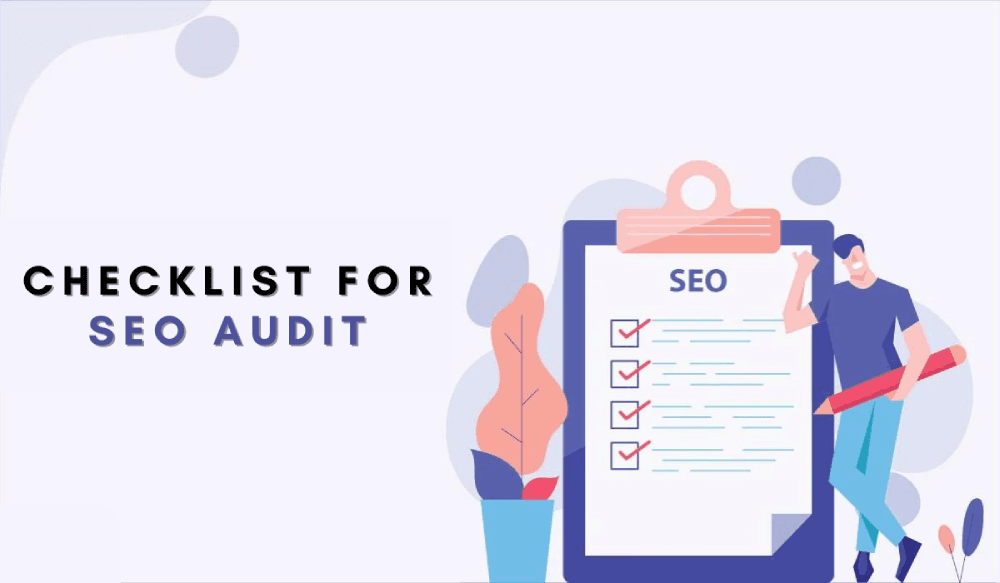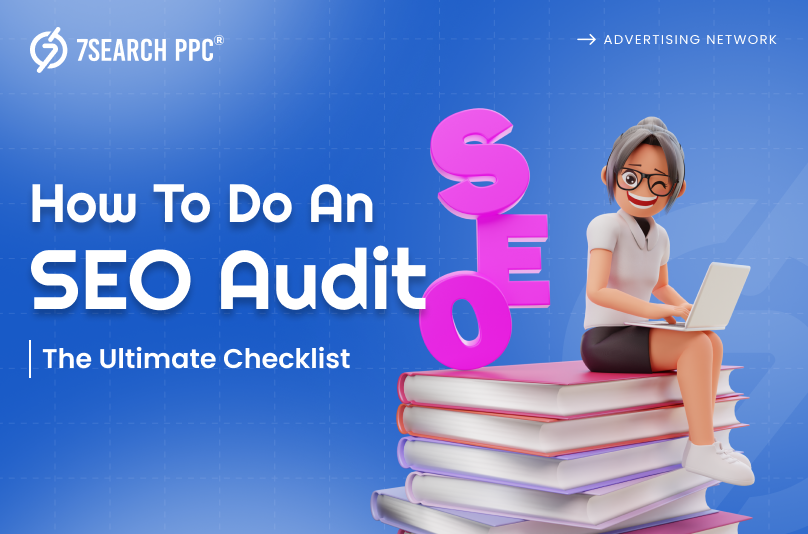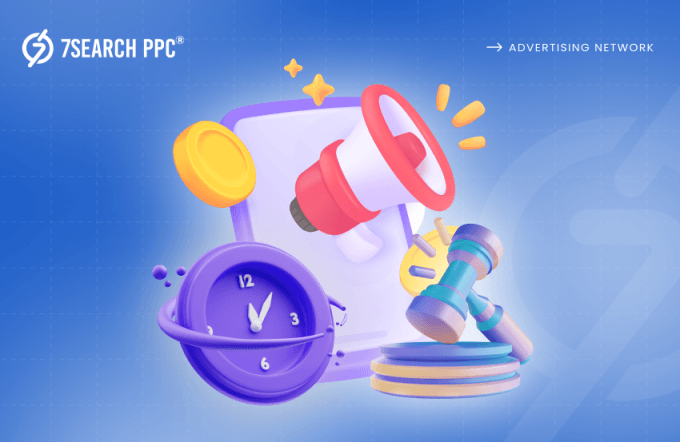Search Engine Optimization (SEO) is the smart tactic that helps your website rise above the competition in the search results. The higher you rank your website, the more organic traffic you will attract and, ultimately, the more leads and sales you’ll convert. But SEO is a constantly changing landscape. What worked yesterday does not guarantee that it will work tomorrow. That’s why regular SEO audits are crucial to identify areas that need improvement. It also ensures that your website stays relevant and competitive in search engine results.
Are you confused about what to check first on your website for an SEO audit? This is not a matter of worry because we have created a checklist that you can refer to for a systematic examination of your website’s SEO health and effectiveness. Come, let’s find out what exactly needs to be on that checklist and how to utilize it to make your website an SEO powerhouse.
SEO Audit: Your Website’s Health Check
An SEO audit is an in-depth inspection of a website’s performance and optimization for search engines. It involves analyzing numerous factors, such as;
- Website Structure
- Content Quality
- Keyword Usage
- Backlink Profile
- Technical Aspects, including page loading speed and mobile friendliness
The aim is to find out what’s working well, what needs fixing, and how to make your site more visible and enhance the ranking in search engine result pages (SERPs). It’s like a roadmap for making your website more popular and getting more people to visit it without paying for ads.
Why Does Your Website Need An SEO Audit?
An SEO audit is like a regular health check-up for your website’s search engine optimization (SEO) performance. Here’s why it is essential;
Identify Technical Issues
The website might have technical issues that make it problematic for search engines to crawl and index it. A technical SEO audit can uncover these problems, like slow loading times, broken links, or mobile compatibility issues.
Check On Content
Content is a king that plays a crucial role in SEO. A regular audit can reveal if your website content is appropriate to the keywords you want to rank for and if it’s captivating and engaging for users. By doing this, you can make your website more visible and valuable to both search engines and users alike.
Improve Rankings
Most audiences visit the top-ranked pages because they trust them to be the most relevant and authoritative source. By solving the issues discovered in the audit, you can improve your website’s rankings on search engine results pages (SERPs). Better rankings mean more visibility and organic traffic to your site.
Stay Competitive
As we discussed in an overview, SEO is a constantly changing landscape. Regular audits help you stay on top of algorithm updates and changes in best practices. It ensures that your website remains competitive in search rankings.
Enhance User Experience
Many factors that impact SEO also affect user experience, leading to a high bounce rate, which is not a good sign of website effectiveness or user satisfaction. By fixing issues like slow loading times or complex site navigation, you can create a better experience for your visitors, leading to higher engagement and conversion rates.
Maximize ROI
Attracting organic traffic is not an easy task for website owners. It takes a lot of time and resources to build credibility and visibility in search engine results. We know that investing time and resources into SEO efforts can be costly. An SEO audit helps you prioritize tasks based on their impact, ensuring that you are getting the best possible return on investment.
A Look At Different Audits: SEO Audit Types
SEO audits are essential for websites to identify areas for improvement and boost their search engine ranking. Different types of Search Engine Optimization audits focus on various aspects of a website. Here is a breakdown of the most common ones;

Technical SEO Audit
A technical SEO audit is like giving your website a comprehensive check-up. It involves examining the technical aspects of your site, such as website structure, URL structure, page speed, mobile friendliness, and security. By finding and fixing any issues, you enhance your website’s potential to rank better in search engine results.
On-page SEO Audit
An on-page SEO audit is a detailed review of individual web pages to optimize their search engine visibility. It analyzes factors such as keyword usage, title tags, meta descriptions, header tags, image alt text, and internal linking to make sure they are optimized for search engines and users. The goal is to spot areas for improvement to boost rankings and enhance user experience on the website, leading to enhanced click-through rates.
Off-page SEO audit
An off-page SEO audit involves assessing factors outside your website that influence its search engine rankings. This audit goes beyond a website and evaluates its external factors, such as backlinks. Backlinks are those links from other websites that point to your website. The quality and volume of backlinks can help you boost your website’s search engine ranking.
SEO Content Audit
An SEO content audit is like giving your website’s content a thorough check-up to see how well it’s performing in search engines. It involves analyzing every piece of content to ensure it’s keyword-optimized, relevant, and engaging. This helps improve your site’s visibility and ranking on SERPs. The audit assesses the quality and relevance of the content on a website. It identifies areas where content can be improved, such as;
- Updating Outdated Information
- Creating New Content On Relevant Topics
- Optimizing Content For Target Keywords
Local SEO Audit
A local SEO audit is like a regular checkup for your online presence in a specific area. It involves examining your website, business listings, and online reviews to see how well you’re showing up in local searches. It helps identify areas for improvement to boost your visibility to people nearby looking for your products or services.
Key Points To Include In The Checklist For SEO Audit
When executing an SEO audit, it’s crucial to cover various aspects to ensure that the website is optimized for search engines effectively. We have researched some key points that you can include in your checklist;

Website Structure and Crawlability
Auditing website structure and crawlability confirms that search engines can easily find and understand your website’s content. This improves your site’s visibility in search results, leading to more organic traffic and potential clientele. It also helps pinpoint and fix any technical issues that could hinder your site’s performance and user experience.
This point involves checking if your website is well-organized, with a clear hierarchy of pages and internal linking that makes it easy for search engines like Google to navigate and index all your website’s content.
Broken Links and Redirects
Auditing broken links and redirects is crucial to improve SEO and ensure a smooth online experience for users. Broken links can frustrate users/visitors, leading to a negative perception of your website. Redirects, if not managed properly, can slow down loading times or even send them to irrelevant pages. Regular audits help maintain website integrity and user satisfaction. Check for these issues and fix them to avoid confusing search engines and users.
This involves identifying any links on your website that lead to non-existent pages (404 errors) and fixing them or including proper redirects (301 redirects) for pages that have moved to a new location.
Mobile Friendliness
A large proportion of internet searches now take place on mobile devices. This point ensures your website is responsive and provides a good user experience on small devices, especially smartphones and tablets. It involves testing your website’s mobile friendliness and making any necessary adjustments to ensure it displays well and is easy to navigate on mobile screens.
Title Tags, Meta Descriptions, and Header Tags
These points are part of on-page SEO. Auditing Title Tags, meta descriptions, and Header Tags ensure they accurately reflect webpage content, aiding search engines in understanding and ranking pages. These elements are important for both SEO and user experience. This point involves checking your title tags and meta descriptions to guarantee they are clear, concise, and keyword-rich, precisely reflecting the content of each page.
Content Quality and Relevance
Valuable, informative, and absorbing content that is relevant to your target audience is important for good SEO. This point involves evaluating your website’s content to ensure it is well-written, informative, and engaging for your target audience. While doing a website audit, you should check that the content is relevant to the keywords you are targeting and provides value to the user.
Image Alt Tags and Internal Linking
While images can enhance your content, they can also obstruct SEO if not optimized. This point involves optimizing your image alt tags with pertinent keywords to help search engines understand the content of your images. Internal linking audits ensure that links within a website are relevant, improving user navigation and SEO. Both practices enhance website usability, accessibility, and search engine visibility, leading to improved overall performance.
Conclusion
An SEO audit is essential for website health and performance. It helps identify areas for improvement in technical SEO, on-page SEO, off-page SEO, content SEO, and local SEO. By checking website structure, broken links, mobile friendliness, content quality, and more, you can ensure your website is fine-tuned for search engines and offers a positive experience to your users. Regularly conducting website audits helps your website stay competitive in search rankings, have better visibility in SERPs, and attain online advertising goals.
Frequently Asked Questions (FAQs)
What exactly is an SEO audit, and why is it important for my website?
Ans. SEO audit is kind of like a checkup for your website. It shows how well your site is doing on search engines like Google. You need it to find areas where you can boost your search engine rankings.
How frequently do I need to do an SEO audit?
Ans. It’s good to do an audit at least once every few months or quarterly to adapt to evolving search engine algorithms and keep your site performing well.
What are the key factors to check in an SEO audit?
Ans. You should look at things like keywords, content quality, site speed, mobile friendliness, backlinks, and technical issues like broken links or errors.
How important is content quality in SEO?
Ans. High-quality content is crucial for SEO. It should be relevant, engaging, and appropriate for your audience. You must avoid duplicate content and keyword stuffing.
While conducting an SEO audit, which should I focus on more: refining on-page SEO elements or enhancing off-page SEO strategies?
Ans. Both are important, my friend. On-page SEO includes optimizing your content and website structure, while off-page SEO includes building quality backlinks and improving your online reputation.



















